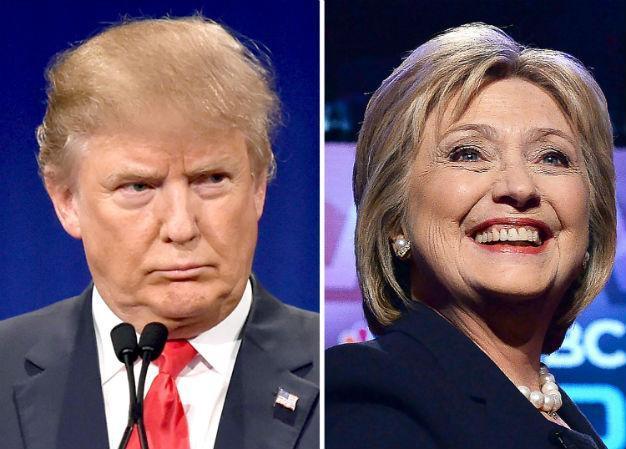Trump, Clinton keep edge with Arizona wins, slip elsewhere
WASHINGTON - Agence France-Presse

AFP photo
Republican Donald Trump and Democrat Hillary Clinton won their parties' primaries in Arizona on March 22 and maintained steep advantages in the presidential nominations race, despite victories by rivals in other states.
Trump extended his lead over nearest rival Ted Cruz in the all-important delegate race, although the arch-conservative senator from Texas made a night of it by resoundingly winning the Utah caucuses.
Clinton's challenger Bernie Sanders, whose grass-roots campaign has refused to yield to the former secretary of state, snatched much-needed victories in Utah and Idaho, blunting Clinton's momentum just as she began to project an image as the inevitable Democratic nominee.
The voting gave the candidates another opportunity to pile up delegates on the way to the party nominating conventions, but it did not dramatically alter the basic outlines of the race.
"Much bigger win than anticipated in Arizona. Thank you, I will never forget!" Trump posted on Twitter.
Trump coralled all 58 delegates at stake in winner-take-all Arizona, where he left Cruz and Ohio Governor John Kasich in his wake, and amid controversy over very long lines at polling stations.
But Cruz bounced back in neighboring Utah, as he appeared on track to winning the state by more than 50 percent, which means he secures all of its 40 delegates.
At this point in the Republican race, Trump's main objective is to amass the 1,237 delegates needed to win his party's nomination outright, and thwart a bid by the party establishment to stop him.
Following Tuesday's votes, Trump stood at 741 delegates, compared to 461 for Cruz and 145 for Kasich, according to a CNN tally.
On the Democratic side, Clinton's Arizona victory was tempered by Sanders's impressive performance in Idaho, where he won the caucuses by a staggering 78 percent to 21 percent, and in Utah, results which allowed him to cut into Clinton's delegate lead, if only slightly.
They were Sanders's first state victories since March 8 in Michigan.
Sanders praised the "tremendous" voter turnout, saying in a statement that "these decisive victories in Idaho and Utah give me confidence that we will continue to win major victories in the coming contests."
But the delegate math looked bleak for the self-described democratic socialist from Vermont. Clinton was projected to finish the night with more than 1,700 delegates, compared with about 930 for Sanders.
To win the Democratic nomination, 2,383 delegates are needed.
The US political mood was dampened by Tuesday's deadly bombings in Brussels. But Trump and Cruz seized the moment to bash President Barack Obama's foreign policy -- and tout their own tough stances on immigration.
Anyone who tries to attack the United States will "suffer greatly," Trump said, in typically blunt tones that have shaped his populist run for the White House, propelling him from outsider to firm favorite for the Republican ticket.
"Belgium is a horror show right now. Terrible things are happening," he said. He also told CNN that Belgian authorities could have thwarted Tuesday's attacks if they had used torture against a terror suspect who was captured days earlier.
Cruz used similarly strong language, calling for US law enforcement to be empowered to "patrol and secure Muslim neighborhoods before they become radicalized."
Clinton thanked Arizona for her victory during a Tuesday night speech in Seattle. But she also forcefully denounced her Republican rivals for their strident talk about how they would respond to the Brussels attacks.
"What Donald Trump, Ted Cruz and others are suggesting is not only wrong, it's dangerous. It will not keep us safe," she said.
"We need a president who can provide leadership that's strong, smart, and steady," she added. "The last thing we need are leaders who incite more fear."
Clinton is expected to build on the themes Wednesday when she delivers a counter-terrorism speech at Stanford University in Palo Alto, California.
Arizona has long been roiled by passions over immigration, an issue Trump has seized on since launching his campaign with inflammatory accusations that Mexico was sending rapists and other criminals across the border and his promise to build a border wall.
The dynamics are different in neighboring Utah, a predominantly Mormon state where polling showed strong opposition to Trump.
Analysts note that Mormons have voted consistently against Trump elsewhere. The Church of Jesus Christ of Latter-day Saints, breaking with the view of many Republicans, has supported immigration reform.
Republicans were also holding caucuses in the Pacific territory of American Samoa.
The next contests are the Democratic votes Saturday in Alaska, Hawaii and Washington state, and primaries for both parties in Wisconsin on April 5.
